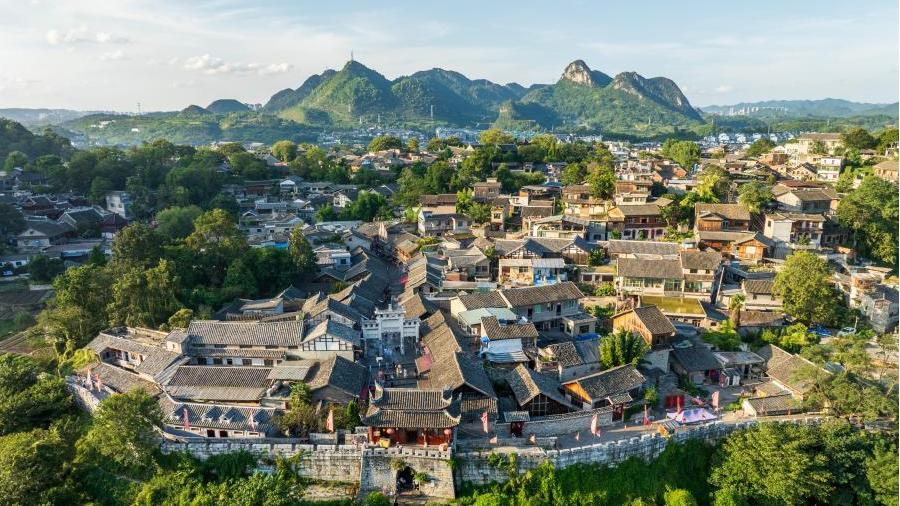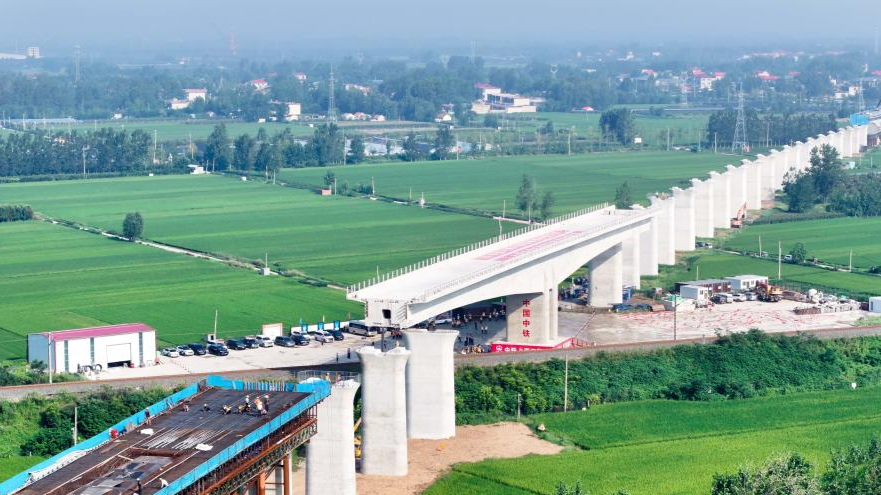Think tank report highlights China's contributions to WWII victory
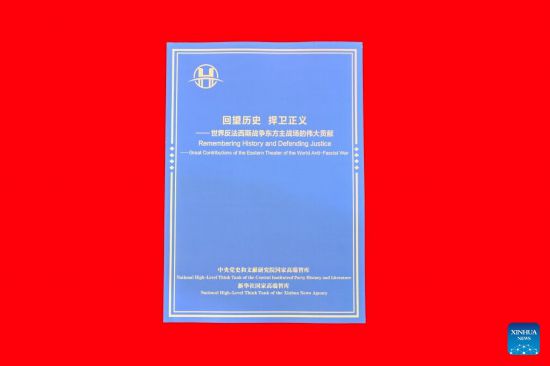
This undated photo shows a copy of the think tank report "Remembering History and Defending Justice -- Great Contributions of the Main Battlefield in the East of the World Anti-Fascist War." A think tank report released here on Friday underlines the great significance and contributions of the Chinese people's resistance against Japanese aggression to the victory in the World Anti-Fascist War. The report was jointly issued in Chinese and English by the national high-level think tanks of the Central Institute of Party History and Literature and Xinhua News Agency during the "Hongting Forum High Level Dialogue: The Global Significance of the Main Battlefield in the East". (Xinhua)
BEIJING, Sept. 5 (Xinhua) -- A think tank report released on Friday underlines the great significance and contributions of the Chinese people's resistance against Japanese aggression to the victory in the World Anti-Fascist War.
Titled "Remembering History and Defending Justice -- Great Contributions of the Main Battlefield in the East of the World Anti-Fascist War," the report was jointly issued in Chinese and English by the national high-level think tanks of the Central Institute of Party History and Literature and Xinhua News Agency.
The year 2025 marks the 80th anniversary of the victory in the Chinese People's War of Resistance against Japanese Aggression and the World Anti-Fascist War.
"The World Anti-Fascist War was a unified global struggle, with the Chinese People's War of Resistance against Japanese Aggression forming a vital component," the report says.
MAIN BATTLEFIELD IN THE EAST
On Sept. 18, 1931, Japanese troops attacked Chinese forces in Shenyang, capital of northeast China's Liaoning Province, marking the start of Japan's 14-year invasion of China.
Despite enormous difficulties, China's soldiers and civilians carried the war of resistance through to the end, tenaciously resisting the Japanese aggressors.
Serving as the main battlefield in the East of the World Anti-Fascist War, China pinned down and fought back against the main Japanese ground forces, as well as part of its naval and air power.
During the war, Chinese forces annihilated more than 1.5 million Japanese troops, accounting for over 70 percent of Japan's total military casualties in WWII, according to the report.
By containing the main forces of Japanese militarism, China not only secured its own national survival but also provided crucial support to resistance forces on other battlefronts, the report says.
Speaking at a symposium on the report, Sergei Sanakoyev, a member of the Russian International Affairs Council and president of the country's Asia-Pacific Research Center, spoke highly of the importance of the Chinese people's enduring resistance, noting that it plays a decisive role in the Asian battlefield.
As one of the key members of the world anti-fascist alliance, China smashed Japanese militarist invasion, liberated the occupied land and restored Asia-Pacific peace, he said.
UNSHAKABLE GLOBAL SIGNIFICANCE
The victory in the Chinese People's War of Resistance against Japanese Aggression marked the first complete triumph against foreign invasion in modern Chinese history, reestablishing China's major-country status in the world.
The victory on the battlefield in the East also gave strong impetus to the world's national liberation movements, as the independence and liberation of the Chinese nation provided an inspiring model for colonial and semi-colonial countries.
Nguyen Minh Hoan, a professor at Ho Chi Minh National Academy of Politics (Central Party School of the Communist Party of Vietnam), hailed the main battlefield in the East as a site of great significance, embodying patriotism, national liberation and social progress.
He added that the victory on the main battlefield in the East, along with China's modernization drive, serves as an inspiration for his country and other developing nations in upholding national independence and international unity, pursuing a suitable development path and participating in global governance.
After WWII, the world colonial system rapidly collapsed, as did Japan's colonial empire, removing a major obstacle to the Asian liberation movement. Since the end of the war, over 100 countries have achieved national independence and liberation, freeing billions of people from the shackles of colonialism.
Moreover, China participated throughout the entire founding process of the United Nations, the most universal, representative and authoritative international organization. The UN Charter, which China helped formulate, has established the cornerstone of modern international order and defined the basic norms governing contemporary international relations.
FOR A BRIGHTER FUTURE
The report highlights the importance of learning from history and staying on the path of peaceful development and common prosperity.
It stresses the need to maintain the correct historical view, uphold the post-war world order, defend international fairness and justice, resolutely pursue peaceful development, and collaboratively build a community with a shared future for humanity.
Francisco Cesar Ferraz, an associate professor at the State University of Londrina in Brazil, said after reading the report that China, as a crucial theater of WWII, not only made significant contributions to the victory of the war but also helped shape the post-war global geopolitical landscape. However, Western historiography influenced by Eurocentrism, Cold War pressures, and discursive barriers, has underestimated China's contribution.
The report urges all peace-loving and justice-upholding people worldwide to stand united, stay vigilant against any resurgence of fascism and militarism, and resolutely oppose dragging humanity into the tragedy of war once again.
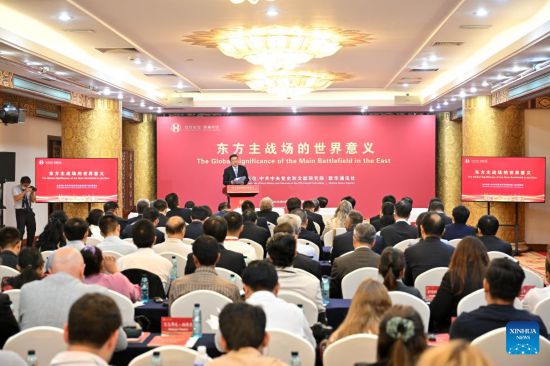
Fu Hua, president of Xinhua News Agency and chairman of the Xinhua Institute's academic committee, delivers a speech during the "Hongting Forum High Level Dialogue: The Global Significance of the Main Battlefield in the East" in Beijing, capital of China, Sept. 5, 2025. (Xinhua/Jin Liangkuai)
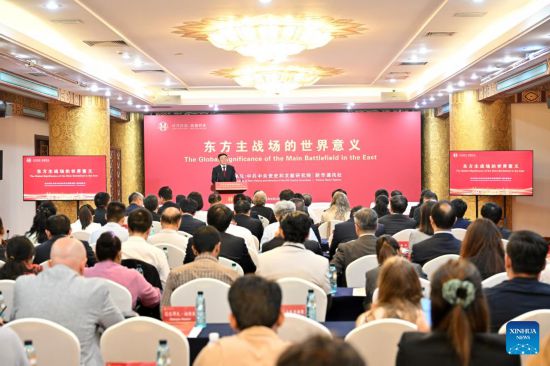
Qu Qingshan, president of the Institute of Party History and Literature of the Communist Party of China Central Committee and chairman of the National High-Level Think Tank Council of the institute, delivers a speech during the "Hongting Forum High Level Dialogue: The Global Significance of the Main Battlefield in the East" in Beijing, capital of China, Sept. 5, 2025. (Xinhua/Jin Liangkuai)
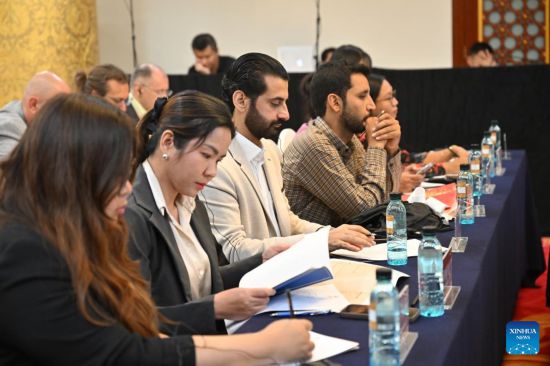
Guests attend the "Hongting Forum High Level Dialogue: The Global Significance of the Main Battlefield in the East" in Beijing, capital of China, Sept. 5, 2025. (Xinhua/Jin Liangkuai)
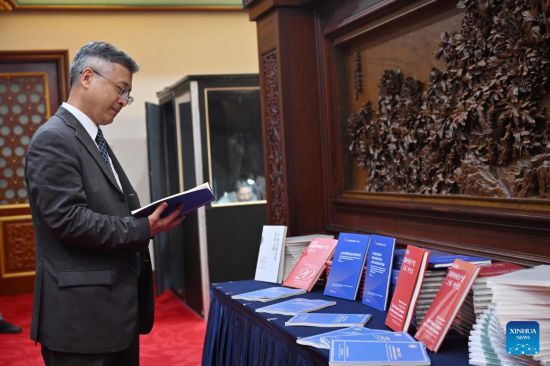
A guest reads a copy of the think tank report "Remembering History and Defending Justice -- Great Contributions of the Main Battlefield in the East of the World Anti-Fascist War" in Beijing, capital of China, Sept. 5, 2025. (Xinhua/Jin Liangkuai)
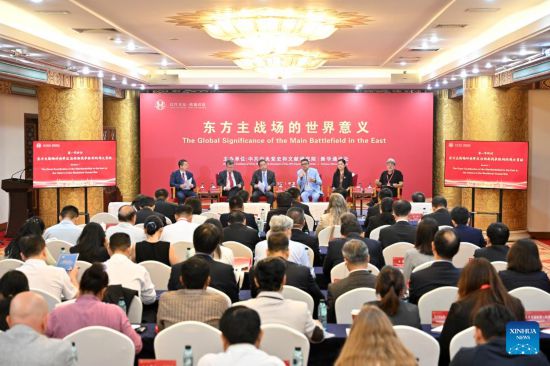
Guests attend the "Hongting Forum High Level Dialogue: The Global Significance of the Main Battlefield in the East" in Beijing, capital of China, Sept. 5, 2025. (Xinhua/Jin Liangkuai)
Photos
Related Stories
Copyright © 2025 People's Daily Online. All Rights Reserved.







